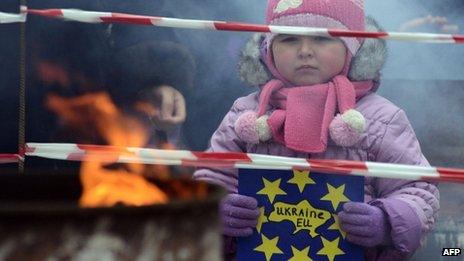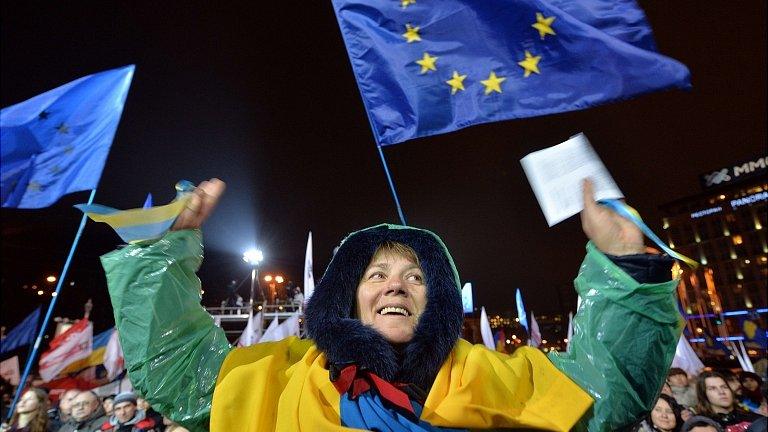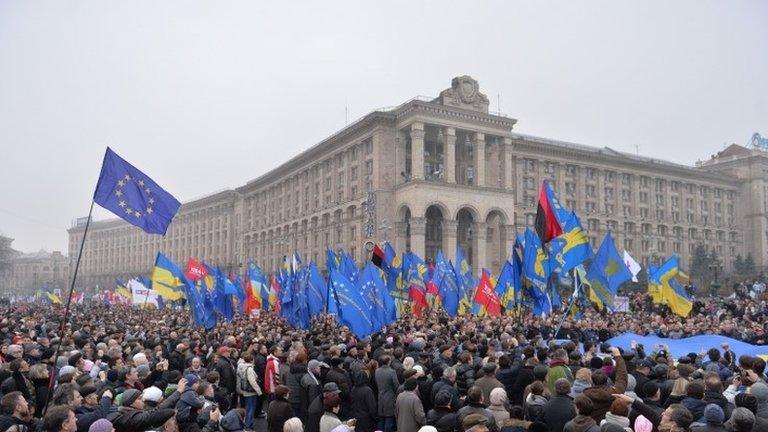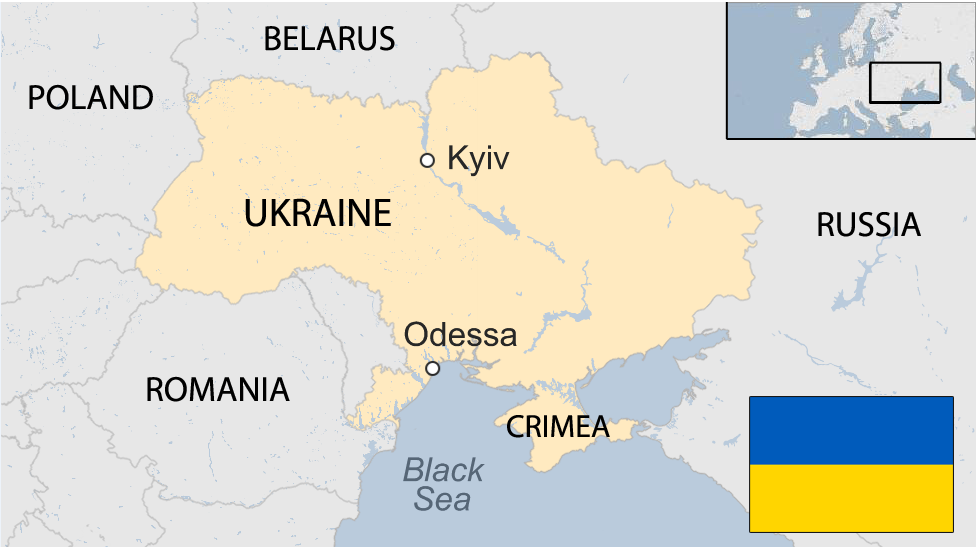Ukraine-EU trade deal 'big threat' to Russia's economy
- Published
Steve Rosenberg compares western and eastern Ukraine
A Ukraine-EU free trade deal would pose a "big threat" to Russia's economy, President Vladimir Putin has said.
He said Russia could be flooded with European goods virtually without tariffs because of an existing free-trade regime between Kiev and Moscow.
Kiev last week put on hold the planned signing of the deal, prompting the EU to accuse Moscow of pressuring Ukraine.
The move triggered mass pro-EU protests in Ukraine. But Ukraine's leader said he wanted better terms in the deal.
"As soon as we reach a level that is comfortable for us, when it meets our interests, when we agree on normal terms, then we will talk about signing," President Viktor Yanukovych told Ukraine's TV channels.
"When this will happen - soon or not so soon - time will tell. I would like that time to come as soon as possible," he added.
The demonstrators have pledged to continue their rallies until at least the end of an EU summit in Vilnius, Lithuania, on 29 November, where Ukraine had originally planned to sign the free trade and association agreement.
'Not ready'

Protesters say Ukraine's future is with the EU, not Russia
Speaking during a visit to Italy, President Putin said Russia's economy would be hit if European goods - seen by Russian analysts as good-quality and relatively cheap - were allowed to transit through Ukraine tariff-free.
He said Russia's agriculture, car and aviation industries would suffer as a result and there could be a jump in unemployment.
"We are not ready to open our gates to European goods."
Mr Putin urged EU officials to refrain from "sharp words" on the issue.
Referring to them as "our friends in Brussels", he said: "Do we have to choke entire sectors of our economy for them to like us?"
On Monday, European Council President Herman Van Rompuy and European Commission President Jose Manuel Barroso said they strongly disapproved of Russia's "position and actions".
But Mr Putin denies pressuring Ukraine, accusing instead the EU of "blackmailing" Ukraine to sign the treaties.
'Road-map'
Ukrainian Prime Minister Mykola Azarov had earlier acknowledged that Russia had suggested delaying signing the treaty to conduct negotiations between Kiev, Moscow and the EU.
He said President Yanukovych would still attend the Vilnius gathering to discuss the possible three-way consultations, and that talks would be in the best interests of Ukraine.
"We absolutely do not want to be a battlefield between the EU and Russia. We want to have good relations with both the EU and Russia."
He also said a separate "road-map" talks with Russia aimed at reviving economic ties would start next month and no agreement had been finalised on possible new financial support from the Kremlin.
Ukraine's government said last Thursday it was halting preparations for signing the deal with the EU, amid concerns this would have a negative impact on Kiev's trade relations with Russia and cause mass job losses as a result.
Tens of thousands of people have since joined protests in Ukraine's major cities.
The BBC's David Stern revisited the scene of the protests
On Sunday, more than 100,000 people rallied in the capital, Kiev, in the largest show of public discontent since the Orange Revolution in 2004 - which saw Mr Yanukovych ousted and a Western-leaning government brought to power.
Mr Yanukovych returned to power in the 2010 presidential election.
Solidarity rallies have also been staged in a number of European capitals, the US and Canada.
Protesters are accusing the president of bowing to growing pressure from Mr Putin, who wants Kiev to join the Moscow-led Customs Union. The grouping also includes Belarus and Kazakhstan.
In a separate development, former Prime Minister Yulia Tymoshenko, one of the leaders of the Orange Revolution who was jailed in 2011 for abuse of power, said on Monday she was starting a hunger strike in solidarity with the protesters.
- Published26 November 2013

- Published25 November 2013

- Published25 November 2013
- Published27 January
